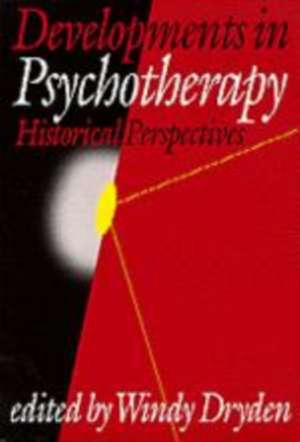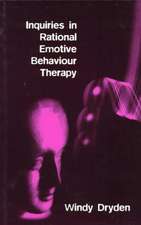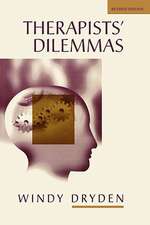Developments in Psychotherapy: Historical Perspectives
Editat de Windy Drydenen Limba Engleză Paperback – 21 aug 1996
________________________________________
This comprehensive and accessible book charts the origins and development of the major non-psychoanalytic fields in counselling and psychotherapy.
Leading British and North American psychotherapists examine a range of approaches including person-centred, transactional analysis, Gestalt, cognitive and behavioural therapy. They discuss how, why and where each approach came about, and the context and influences under which it was formulated. They go on to survey the further development of theory and practice in each case, taking in the most significant trends and highlighting advances which are often not recognized or fully understood. Each approach is then brought firmly up to date with an overview of its current ideology and direction, so that readers can relate its present-day context to its historical background.
Preț: 430.93 lei
Preț vechi: 506.97 lei
-15% Nou
Puncte Express: 646
Preț estimativ în valută:
82.46€ • 86.09$ • 68.24£
82.46€ • 86.09$ • 68.24£
Carte tipărită la comandă
Livrare economică 04-18 aprilie
Preluare comenzi: 021 569.72.76
Specificații
ISBN-13: 9780803979123
ISBN-10: 0803979126
Pagini: 288
Dimensiuni: 156 x 234 x 15 mm
Greutate: 0.4 kg
Ediția:1
Editura: SAGE Publications
Colecția Sage Publications Ltd
Locul publicării:London, United Kingdom
ISBN-10: 0803979126
Pagini: 288
Dimensiuni: 156 x 234 x 15 mm
Greutate: 0.4 kg
Ediția:1
Editura: SAGE Publications
Colecția Sage Publications Ltd
Locul publicării:London, United Kingdom
Recenzii
`An exciting collection of current thought about the diverse applications and systems that are present in today's eclectic psychotherapy science... This book shows that there is a need for integration and harmony rather than antagonism. We are after all at heart attempting to serve in whichever way we feel is our truth. This is a book that evokes and creates thought; depending upon your own therapeutic approach, there is much to offer by way of alternatives, free association and appreciation of other schools, and it is here that Dryden's editing is excellent' - Counselling, The Journal of the British Association for Counselling
`An important collection' - Scientific and Medical Network Journal
`Windy Dryden is to be congratulated on this comprehensive collection which will give the student and practitioner a valuable overview of the non-psychoanalytic fields in counselling and psychotherapy... the 14 contributors have created an accessible textbook which brings the approaches [covered] well into the latter half of the 90s' - [ac]Eisteach, The Journal of the Irish Association for Counselling and Therapy
`Charting the main theoretical and practical developments in the major non-psychoanalytic approaches to psychotherapy... this book seems to be a very useful one to anyone studying these matters in a serious way. And really there is nothing like it elsewhere' - Self & Society
`A good narrative introduction to many approaches' - Journal of the History of the Behavioral Sciences
`An important collection' - Scientific and Medical Network Journal
`Windy Dryden is to be congratulated on this comprehensive collection which will give the student and practitioner a valuable overview of the non-psychoanalytic fields in counselling and psychotherapy... the 14 contributors have created an accessible textbook which brings the approaches [covered] well into the latter half of the 90s' - [ac]Eisteach, The Journal of the Irish Association for Counselling and Therapy
`Charting the main theoretical and practical developments in the major non-psychoanalytic approaches to psychotherapy... this book seems to be a very useful one to anyone studying these matters in a serious way. And really there is nothing like it elsewhere' - Self & Society
`A good narrative introduction to many approaches' - Journal of the History of the Behavioral Sciences
Cuprins
Person-Centred Psychotherapy - Nathaniel J Raskin
Twenty Historical Steps
The Existential-Phenomenological Movement, 1834-1995 - Simon du Plock
Developments in Transactional Analysis - Ian Stewart
Developments in Gestalt Therapy - Malcolm Parlett and Judith Hemming
Developments in Transpersonal Psychotherapy - John Rowan
Looking Back, Looking Forward - Robert A Neimeyer and Joel M Martin
Personal Construct Therapy in Sociohistorical Perspective
Developments in Behaviour Therapy - Robert Newell
Developments in Cognitive Therapy, 1960-95 - Marjorie E Weishaar
Trends in Rational Emotive Behaviour Therapy, 1955-95 - Michael Neenan and Windy Dryden
Developments in Psychotherapy Integration - Cory F Newman and Marvin R Goldfried
Twenty Historical Steps
The Existential-Phenomenological Movement, 1834-1995 - Simon du Plock
Developments in Transactional Analysis - Ian Stewart
Developments in Gestalt Therapy - Malcolm Parlett and Judith Hemming
Developments in Transpersonal Psychotherapy - John Rowan
Looking Back, Looking Forward - Robert A Neimeyer and Joel M Martin
Personal Construct Therapy in Sociohistorical Perspective
Developments in Behaviour Therapy - Robert Newell
Developments in Cognitive Therapy, 1960-95 - Marjorie E Weishaar
Trends in Rational Emotive Behaviour Therapy, 1955-95 - Michael Neenan and Windy Dryden
Developments in Psychotherapy Integration - Cory F Newman and Marvin R Goldfried
Descriere
This comprehensive and accessible book charts the origins and development of the major non-psychoanalytic fields in counselling and psychotherapy.
Leading British and North American psychotherapists examine a range of approaches including person-centred, transactional analysis, Gestalt, cognitive and behavioural therapy. They discuss how, why and where each approach came about, and the context and influences under which it was formulated. They go on to survey the further development of theory and practice in each case, taking in the most significant trends and highlighting advances which are often not recognized or fully understood. Each approach is then brought firmly up to date with an overview of its current ideology and
















